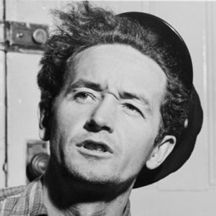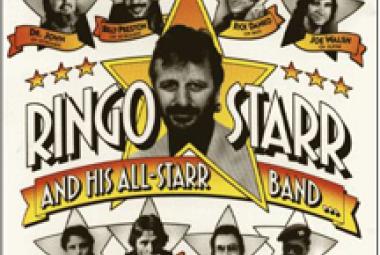Woody Guthrie (July 14, 1912 – October 3, 1967) was an American singer-songwriter and musician whose musical legacy includes hundreds of political, traditional and children’s songs, ballads and improvised works. His best-known song is “This Land Is Your Land”. Many of his recorded songs are archived in the Library of Congress. Many of his songs are about his experiences in the Dust Bowl era during the Great Depression when Guthrie traveled with displaced farmers from Oklahoma to California and learned their traditional folk and blues songs, earning him the nickname the “Dust Bowl Troubadour”. Guthrie was married three times and fathered eight children, including American folk musician Arlo Guthrie. During his later years, in spite of his illness, Guthrie served as a figurehead in the folk movement, providing inspiration to a generation of new folk musicians, including mentor relationships with Ramblin’ Jack Elliott and Bob Dylan. (More from Wikipedia)
I was rather surprised years later to hear my home town come up again as I played one of the songs on the two excellent Mermaid Avenue CD’s, consisting of a set of performances of the lyrics to several of literally hundreds of unrecorded songs by Woody Guthrie that were set to music by the American rock band Wilco and the English singer-songwriter Billy Bragg. One of the songs, “Aginst th’ Law” goes on and on about all of these illegalities – “It’s against the law to talk, and it’s against the law to walk”, etc. – and later in the song, there is the lyric: “Everything in Winston-Salem is against the law!”
(March 2013)
In conclusion, I am not trying to say that Bob Dylan didn’t perform protest songs; clearly he did, in the broadest sense of the term at least. However, Dylan never vented his outrage in the way that you expected, and he never went after the easy targets. While I am certainly no expert, from what I know of Woody Guthrie – Bob Dylan’s direct inspiration and even his mentor to a limited extent – much the same could be said of his music as well.
(May 2013)
* * *
In 2010, Nina Hagen released an album called Personal Jesus that is described by James Christopher Monger in Allmusic as: “German punk icon Nina Hagen’s first collection of new music in nearly four years features 13 faith-based tracks that dutifully blend rock, blues, soul, and gospel into a sound that’s distinctly hers.” The album includes covers of the Depeche Mode title song, “Personal Jesus”, several traditional gospel songs, a Larry Gatlin number called “Help Me”, and a Woody Guthrie song called “All You Fascists Bound to Lose”.
(November 2014)
* * *
The entry on the Carter Family in Allmusic (by David Vinopal) includes: “Comprised of a gaunt, shy gospel quartet member named Alvin P. Carter and two reserved country girls – his wife, Sara [Dougherty Carter], and their sister-in-law, Maybelle [Addington Carter] – the Carter Family sang a pure, simple harmony that influenced not only the numerous other family groups of the ’30s and the ’40s, but folk, bluegrass, and rock musicians like Woody Guthrie, Bill Monroe, the Kingston Trio, Doc Watson, Bob Dylan, and Emmylou Harris, to mention just a few. It’s unlikely that bluegrass music would have existed without the Carter Family.”
* * *
But that was just the beginning. One of the A. P. Carter songs on The Famous Carter Family is so timeless that it is hard to imagine anyone writing it: “Keep on the Sunny Side”. There are three bonafide classic gospel songs: “Can the Circle be Unbroken”, “Lonesome Valley”, and “Gospel Ship”. Another song was one I knew as a Woody Guthrie number, “Worried Man Blues”. The other songs I was not familiar with but quickly learned to love as much as the others. I gathered up a few more Carter Family albums and learned what I could about them.
(February 2015)
* * *
But solo songwriting is a lonely profession, and success is far from guaranteed. Bob Dylan’s first album, Bob Dylan did not particularly showcase Dylan’s songwriting talent; there were only two original songs on the album. and the tunes to both had similarities with his mentor Woody Guthrie’s songs. In fact, says Wikipedia: “Mitch Miller, Columbia [Records]’s chief of A&R at the time, said U.S. sales totaled about 2,500 copies. Bob Dylan remains Dylan’s only release not to chart at all in the US, though it eventually reached #13 in the UK charts in 1965. Despite the album’s poor performance, financially it was not disastrous because the album was very cheap to record.” Bob Dylan was one of the first Dylan albums that I purchased, and I am astounded that this album never made the charts.
(March 2015)
* * *
In my last post, I was mostly talking about solo songwriters like Bob Dylan and Woody Guthrie, but writing songs is primarily a collaborative profession. In many cases, the music and the lyrics would be written separately. Richard Rodgers was a towering figure in writing music for Broadway shows and other productions; he primarily worked with two different lyricists over the years, Lorenz Hart and Oscar Hammerstein II.
(April 2015/1)
* * *















